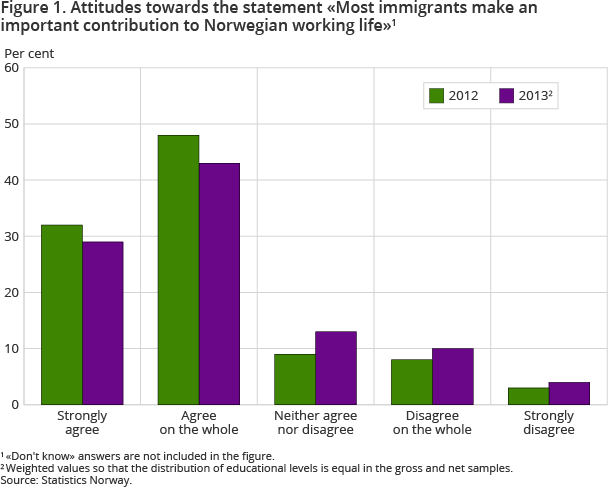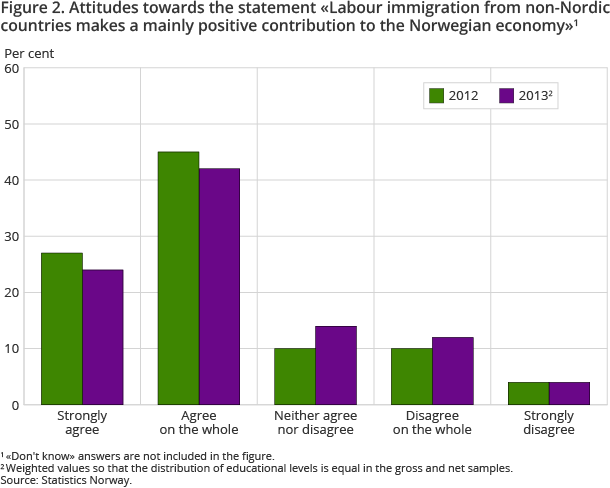Content
Published:
This is an archived release.
Reduced confidence in the value of immigrants' contribution in the workplace
Confidence among the population in the value of immigrants' contribution in the workplace in 2013 has fallen from 2012. The proportion agreeing that "Immigrants make an important contribution to Norwegian working life" decreased by 8 percentage points from 2012 to 2013.
| 2004 | 2012 | 2013 | |
|---|---|---|---|
| Most immigrants make an important contribution to Norwegian working life | |||
| Strongly agree | 21 | 32 | 29 |
| Agree on the whole | 47 | 48 | 43 |
| Disagree on the whole | 15 | 8 | 10 |
| Strongly disagree | 6 | 3 | 4 |
| Most immigrants enrich the cultural life in Norway | |||
| Strongly agree | 27 | 34 | 32 |
| Agree on the whole | 39 | 39 | 37 |
| Disagree on the whole | 14 | 10 | 13 |
| Strongly disagree | 8 | 5 | 4 |
| Most immigrants are a cause of insecurity in society | |||
| Strongly agree | 14 | 10 | 11 |
| Agree on the whole | 27 | 23 | 24 |
| Disagree on the whole | 31 | 31 | 30 |
| Strongly disagree | 16 | 23 | 22 |
| Attitudes towards refugees' and asylum seekers' access to residence permits in Norway. Compared to today, should it be easier, more difficult or remain the same as today? | |||
| Easier | 6 | 7 | 7 |
| As today | 44 | 44 | 47 |
| More difficult | 47 | 43 | 42 |


This is shown in the annual population survey of attitudes towards immigrants and immigration conducted by Statistics Norway between 1 July and 10 August this year.
The share agreeing that "Most immigrants make an important contribution to Norwegian working life" was 72 per cent this year compared to 80 per cent the year before, which was the highest share since the question was introduced in 2002. Fourteen per cent disagreed this year, and 13 per cent answered "either/or".
Weakened belief in the value of labour migration
Another assertion about immigrants on the labour market also received less support in this year’s survey. The share agreeing completely or on the whole that “Labour immigration from non-Nordic countries makes a mainly positive contribution to the Norwegian economy” fell by 5 percentage points. The support for this statement is now 66 per cent, while the share disagreeing is 16 per cent.
Reduced expectations of being Norwegian
Moreover, we see a minor decrease of 4 percentage points in the proportion agreeing that “Immigrants in Norway should endeavour to become as similar to Norwegians as possible”. There is, nevertheless, still a larger share - 49 per cent - supporting this statement, while 41 per cent disagree.
Half of respondents reject the idea that immigrants abuse social welfare
Half of respondents also still disagree with the assertion that “most immigrants abuse the social welfare system”, while a third believe this to be true. The corresponding shares for the assertion that immigrants are a “source of insecurity in society” are roughly the same. Seven out of ten agree that most immigrants “enrich the cultural life in Norway”; a few percentage points less than last year, but not significantly different. The proportion agreeing that “immigrants in Norway should have the same job opportunities as Norwegians”, is unchanged from 2012 at 86 per cent.
Forty-two per cent now think it should be more difficult for refugees to obtain a residence permit in Norway, while 47 per cent think that access to permits should remain the same as today. Last year, opinion was split down the middle in relation to this question. As before, 7 per cent think that it should be easier to obtain a residence permit in Norway. None of these changes are statistically significant.
Varying attitudes according to background factors
Basically, women and men have similar attitudes to immigrants, but women are slightly more liberal in relation to some aspects. This is, however, not the case in work-related questions. The most elderly are generally more sceptical towards immigrants and immigration than other age groups. Which of the two youngest groups (16-24 and 25-44 years) is the most immigrant friendly can vary. A breakdown by education, shows that acceptance of immigrants is greatest among the highly educated. The acceptance varies also according to the urban/rural dimension, with the greatest degree of benevolence being found in the most urban areas.
Purpose of the surveyOpen and readClose
Statistic Norway’s annual survey on attitudes towards immigrants and immigration is conducted on behalf of the Ministry of Justice and Public Security. The aim is to reflect the sentiment of the population with regard to various aspects of the country’s immigration and refugee policy and towards immigrants as a group.
Contact
-
Frøydis Strøm
E-mail: froydis.strom@ssb.no
tel.: (+47) 40 81 13 17
-
Christian Sørlien Molstad
E-mail: christian.molstad@ssb.no
tel.: (+47) 46 65 99 12
